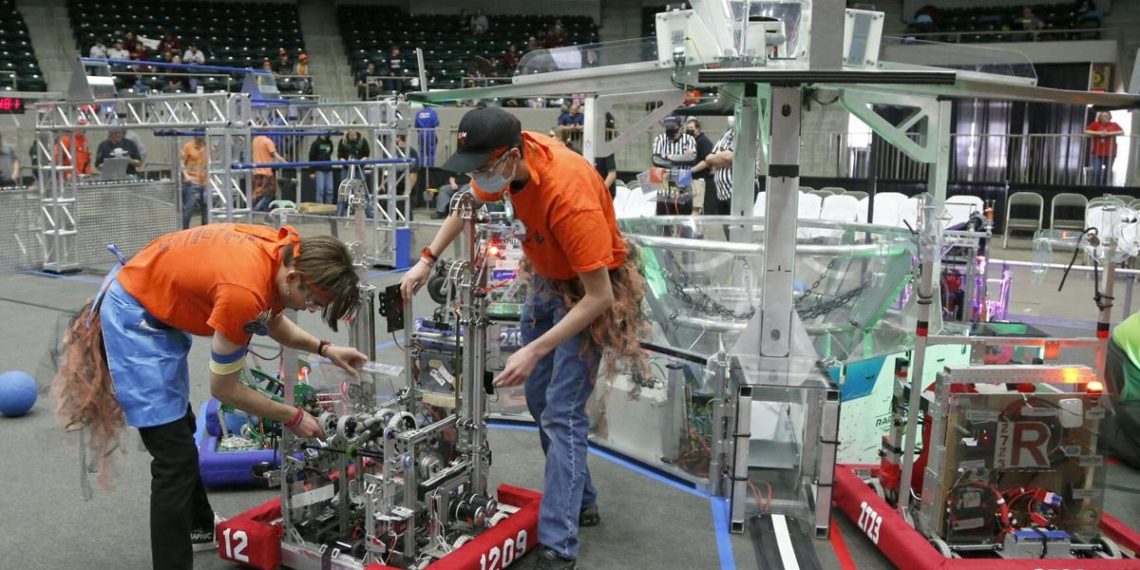It took two extra years to make it happen, but robots have temporarily taken over the Expo Square Pavilion.
Originally slated for the spring of 2020, FIRST Robotics is hosting its inaugural Green Country Regional competition on Friday and Saturday for 37 teams of high school students and their robots.
FIRST — the acronym of For Inspiration and Recognition of Science and Technology — is an international youth organization that operates the FIRST Robotics Competition. The Tulsa event is open to the public from 8:30 a.m. to 6:30 p.m. both days, and admission is free.
With the regional turnout exceeding expectations, FIRST Robotics Regional Director Melinda Taylor said the event will be back in Tulsa in 2023.
“We have a lot of eastern teams who were always having to travel to Oklahoma City,” she said. “We thought it would be good to have a regional out this way to help relieve the costs for those teams. It’s been a great opportunity for all the teams and has brought in people from other states.”
People are also reading…
Along with teams from Broken Arrow, Booker T. Washington, Cascia Hall, Collinsville, Jenks and Union, the event has also brought in squads from across Oklahoma, as well as Mexico and five other states. The top two finishers will advance to the world championships in Houston, scheduled for April 20-23.
With guidance from volunteer mentors, FIRST Robotics events require teams of high school students to design, build, program and drive their robots to complete a specific challenge.
Although the mentors and coaches show the students how to use the necessary tools and encourage them to figure out how to make their robot work, they are hands-off when it comes to the actual construction portion, no matter how challenging that may be.
“It’s basically guiding,” Tahlequah Sequoyah coach Edward Culie said. “The kids come up with the plans and execute them. I’m just there to help as needed.”
This year’s competition game is a series of matches in which teams’ robots get less than 3 minutes to retrieve as many color-coded oversized rubber balls as possible and attempt to launch them into an elevated hub, with each ball worth up to two points. The robots run on preprogrammed instructions for the first 15 seconds before the student drivers take control.
Teams can score additional points if their robots are able to successfully navigate through a series of elevated rungs on the edge of the playing field. Up to six robots are on the field at a time, so even with safety precautions in place to protect key components and prevent metal-on-metal contact, collisions still happen.
“If your robot doesn’t get hit, you’re probably not doing something right,” Booker T. Washington’s Ethan Clegg said.
In addition to figuring out how navigate around the occasional dropped battery, many of the students are having to get reacquainted with competing in person. The 2020 season was halted due to the pandemic, and the 2021 regionals were held entirely online.
“This year has been my first in-person events,” Booker T. Washington junior Ella Hampton said. “My freshman year, we were sitting in the arena in Oklahoma City when they sent us all home. It’s been really nice to be able to have in-person competitions while the seniors are still here to show us how those events work.”
For Clegg, Hampton and other members of Booker T. Washington’s team, the RoboHornets, having a regional in town is bittersweet. While grateful for the opportunity to compete in person close to home, several lamented being the only Tulsa Public Schools team at Expo Square Pavilion and said they want to see more robotics teams from across the district at future meets.
“We want this to grow,” team mentor and driving coach Tammy Wardlaw said. “We don’t just want this to be a Booker T. thing. We want this to be a Tulsa thing. We want to be able to compete against the other TPS schools and our classmates.”
Featured video: All-girl Afghan robotics team flees home
lenzy.krehbiel-burton@tulsaworld.com
Credit: Source link





















